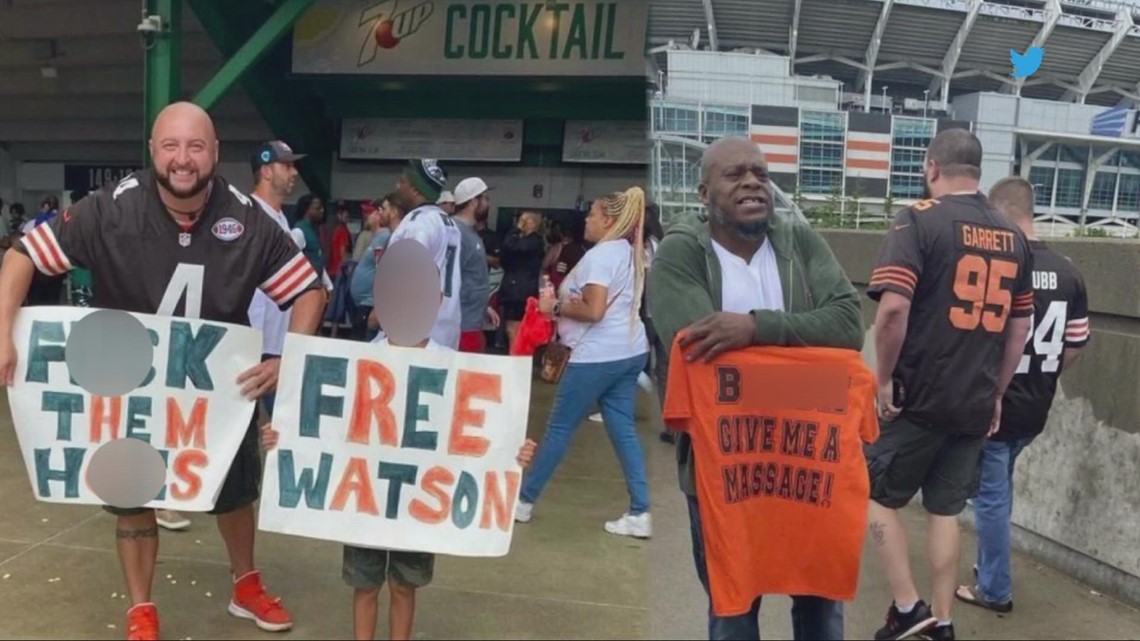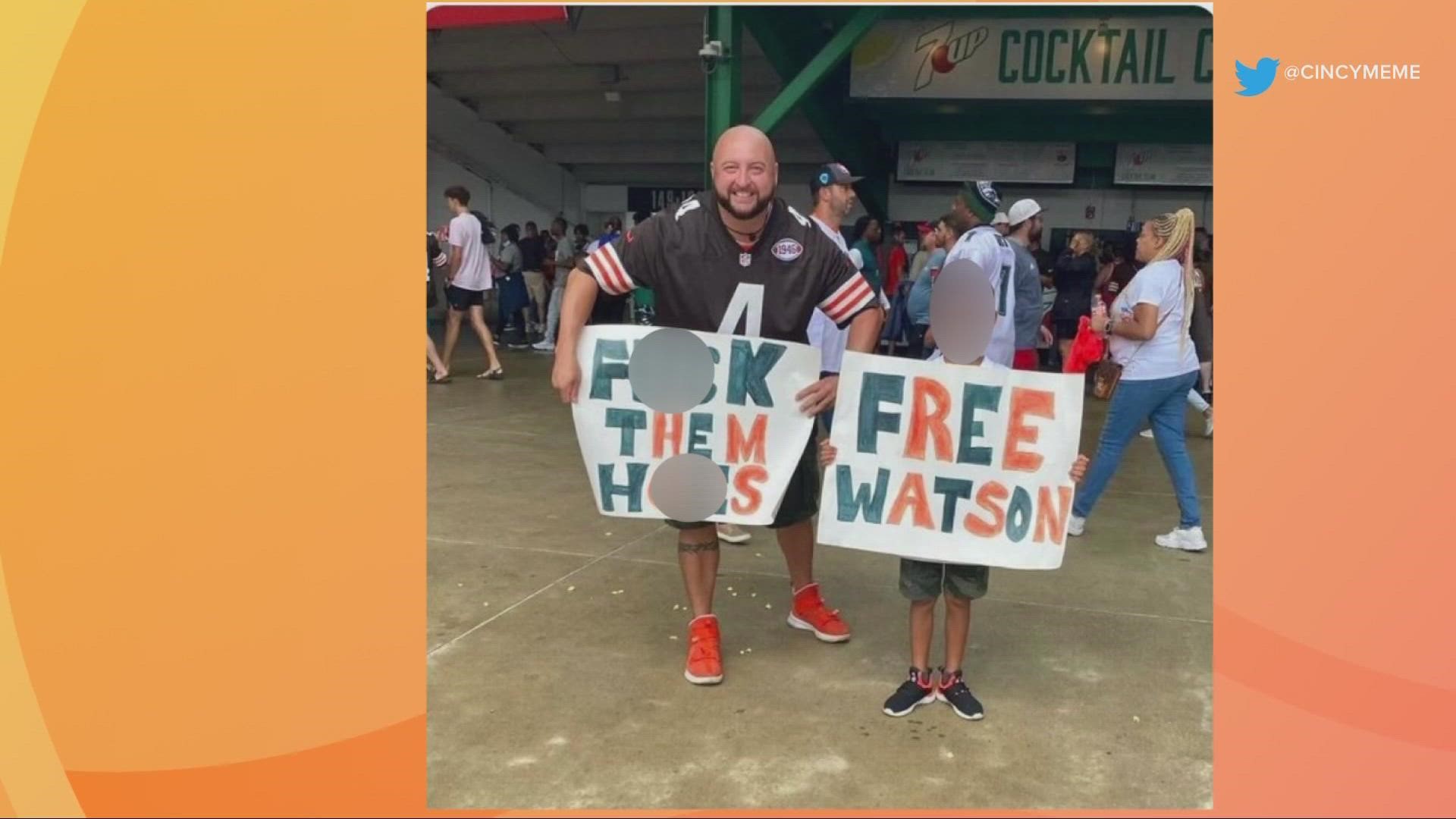CLEVELAND — Photos appearing to have been taken at the Cleveland Browns’ first preseason home game at FirstEnergy stadium show t-shirts and posters with vulgar messages and profanity. The messages on the gear seem to reference the controversy surrounding star quarterback Deshaun Watson, who has been accused by multiple women of sexual misconduct, including harassment and assault.
One image is a photo of a t-shirt, beginning with an expletive then reading “give me a massage,” alluding to the allegations made against Watson by women working as massage therapists.
The other image shows a man and a boy, both holding signs, one of which begins with an expletive and refers to women with a derogatory term. The second poster reads “Free Watson.”


3News reached out to the Browns organization for information on policies surrounding these types of vulgar messages, signs, and merchandise at games, and were directed to FirstEnergy Stadium policies, including the banners/signs policy, which reads:
FirstEnergy Stadium banners/signs policy:
Banners and signs are permitted, but must be in good taste, cannot obstruct another fan’s view and cannot cover any stadium signage. They may not contain commercial messages, logos political endorsements, or be divisive or controversial in nature. Signs on poles or sticks, constructed of wood or metal material are also not permitted. Fans are permitted to hang banners and signs that adhere to these guidelines along the field wall as long as they do not interfere with any messaging placed by the Browns, their partners or the NFL. Management reserves the right to determine what signs are in violation of stadium policy. Failure to forfeit non-compliant materials to management will result in ejection from the stadium.
In that email response, the organization also wrote “FirstEnergy Stadium’s Prohibited Items list specifically includes ‘t-shirts/clothing with vulgar and offensive language’ and ‘any other item deemed inappropriate by stadium management.’”
In addition to: “'Any [other] item deemed inappropriate by stadium management’ and ‘must be in good taste’ prohibit banners, signs and all items that include profane, vulgar or offensive language/content.”
3News followed up and asked the Browns organization specifically about how these fans were allowed in with these posters, which do contain “vulgar and offensive language,” as well as what will happen to fans if they attempt to enter with these signs and if staff is equipped to spot the signs.
“We have a long-standing, diligent process in place," the team responded.
Robyn Lockner is a lifelong Browns fan, and the founder of the Facebook group Cleveland Browns Women’s Group, which was created for female Browns fans.
She said she’s seen similar shirts referencing other players throughout the years, and said she found humor in this particular shirt. However, she acknowledged the shirts’ potential impact on survivors.
“For victims of sexual assault, I can see how they view that as degrading, and I’m not trying to take away from that at all,” she said.
Lockner said that she has seen staff at Browns games in the past asking attendees to remove or flip inside-out t-shirts that were inappropriate.
However, when it comes to the signs, it’s a different story for Lockner.
“I do think that was tasteless and disrespectful to women in general, especially the victims or you know, the ladies who accused Deshaun Watson,” she said of the signs.
Lockner said while Browns fans are loyal and stick together, she does not want these messages to represent them.
“That’s not who we are as Cleveland Browns fans,” she said.
3News also spoke with a legal expert to discuss first amendment protections in situations like this.
“I mean, it certainly is to me offensive on a whole host of levels,” said Bryan Adamson, chaired professor of law at Case Western Reserve University School of Law. Among his courses, Adamson teaches first amendment-related classes and constitutional law.
When considering free speech, Adamson referenced a Supreme Court precedent-setting case called Cohen v. California, in which a man wore a jacket with an expletive on it into a courthouse.
“[The] Cohen v. California case severely limited the ability of states to enforce or criminalize speech, even vulgar and offensive cases, as what is the case here,” he said.
From that case, Adamson said that simply uttering or displaying a word, so long as it does not incite violence or lawless action, is not sufficient to suppress that speech.
“The case is basically saying language, however vulgar, is protected by the first amendment, even in public spaces,” he said.
Instead, Adamson said the majority opinion in that case stated that if people are offended by certain language, they can “avert their eyes.”
Adamson, however, did point out that there can be rules that are enforced in spaces such as FirstEnergy Stadium. For example, “failure to forfeit non-compliant materials to management will result in ejection from the stadium,” per FirstEnergy Stadium policy. FirstEnergy Stadium is owned by the City of Cleveland and operated by the Browns.
However, when it comes to criminal or legal action surrounding the language, Adamson said those types of speech are given “broad latitude.”
3News reached out to the Cleveland Rape Crisis Center, which replied that it wasn't in a position to comment on the images. 3News also reached out to the City of Cleveland, but has yet to hear back.
Related Stories:

